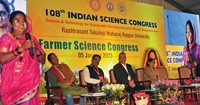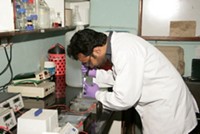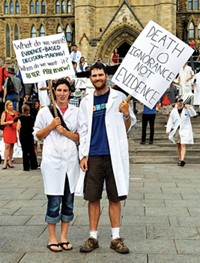Advertisement
Grab your lab coat. Let's get started
Welcome!
Welcome!
Create an account below to get 6 C&EN articles per month, receive newsletters and more - all free.
It seems this is your first time logging in online. Please enter the following information to continue.
As an ACS member you automatically get access to this site. All we need is few more details to create your reading experience.
Not you? Sign in with a different account.
Not you? Sign in with a different account.
ERROR 1
ERROR 1
ERROR 2
ERROR 2
ERROR 2
ERROR 2
ERROR 2
Password and Confirm password must match.
If you have an ACS member number, please enter it here so we can link this account to your membership. (optional)
ERROR 2
ACS values your privacy. By submitting your information, you are gaining access to C&EN and subscribing to our weekly newsletter. We use the information you provide to make your reading experience better, and we will never sell your data to third party members.
Policy
Indian scientists protest unscientific ideas, call for more funding
Organizers of demonstrations seek response from government
by K. V. Venkatasubramanian
September 25, 2017
| A version of this story appeared in
Volume 95, Issue 38

The Indian scientific community came together last month to publicly demonstrate about the government’s seeming apathy toward issues affecting their profession.
In a show of solidarity, about 15,000 scientists, researchers, teachers, and students thronged the streets of 26 Indian cities on Aug. 9. They called for more government funding for basic science research and for what they called evidence-based science education. The organizers say the rallies marked the first public demonstrations requesting that the Indian government not let science education be muddied with unscientific elements or stifled by falling quality and rising expenses.
The demonstrations were inspired by the global March for Science on April 22 that saw more than a million people rallying in hundreds of cities. But back in April, little was heard in India.
The August protests were coordinated by the Breakthrough Science Society (BSS), a nonprofit organization that promotes scientific thought. The organizers of the demonstrations submitted a petition to Prime Minister Narendra Modi formally raising their concerns. Soumitro Banerjee, a physical sciences professor at the Indian Institute of Science Education & Research Kolkata and all-India general secretary for BSS, says there has been no response yet from the prime minister or his office.
The petition says, ‘‘In recent times, attempts to spread unscientific beliefs and superstitions are on the rise. Sometimes, unscientific ideas lacking in evidence are being propagated as science, patronised by persons in high positions. This is vitiating the cultural atmosphere of the country.’’
Mayank N. Vahia, an astrophysicist at the Tata Institute of Fundamental Research in Mumbai, says, “The present-day government seems somewhat preoccupied with the idea that our glorious past is not well appreciated. This is partly true. But in the zeal to protect our past achievements, many impossible claims are being supported and our view of modern science is being clouded out, not to mention being funded out. This is dangerous.”
As an example, Vahia cites the Pushpaka Vimāna, a flying palace or chariot portrayed in Hindu and Jain texts and Sanskrit epic poems. Presenters at the Indian Science Congress in 2015 pointed to such texts to support a claim that aircraft were invented in the Vedic era between 1500 and 500 B.C.
And in the government sphere, the education minister of the northwest Indian state of Rajasthan said in January that the cow is the only animal that “inhales and exhales oxygen,” according to news reports.
BSS says, “On the one hand, scientists from India have played a commendable role in the discovery of gravitational waves and of Higgs Boson, in the interplanetary mission through Mangalyaan,” India’s Mars Orbiter Mission. “On the other, science in India is facing the danger of being eclipsed by a rising wave of unscientific beliefs.”
In addition, BSS is concerned about government financial support for scientific work. “Universities are facing shortage of funds to adequately support scientific research,” its petition says. “Research funding agencies like [the Department of Science & Technology, Department of Biotechnology, and Council for Scientific & Industrial Research] are reportedly impacted by reduced governmental support. Scientists in government laboratories are being asked to generate a part of their salary by selling their inventions and from other sources.”
Subramony Mahadevan, a professor of molecular reproduction, development, and genetics at the Indian Institute of Science in Bangalore, points out that the issues are not unique to India. Many governments the world over expect quick returns for investment in science research, he says. “This is shortsighted, as commercialization of scientific discoveries often needs substantial incubation time,” he says.
The scientists also urged India’s central and state governments to raise their combined expenditure on education to 10% of India’s gross domestic product to build the necessary infrastructure to provide children with quality educations.
Banerjee says the march organizers are chalking out their next step. K. S. Rajani, Karnataka state secretary for BSS, says, “Meetings have been scheduled in Bangalore and Kolkata in September and across India later to decide the next course.”
K. V. Venkatasubramanian is a freelance journalist based in Delhi.





Join the conversation
Contact the reporter
Submit a Letter to the Editor for publication
Engage with us on Twitter